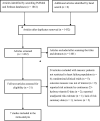Is vitamin D deficiency a risk factor for all-cause mortality and rehospitalization in heart failure patients?: A systematic review and meta-analysis
- PMID: 35839043
- PMCID: PMC11132358
- DOI: 10.1097/MD.0000000000029507
Is vitamin D deficiency a risk factor for all-cause mortality and rehospitalization in heart failure patients?: A systematic review and meta-analysis
Abstract
Objective: The association of low 25-hydroxyvitamin D level with mortality and rehospitalization remains inconsistent in patients with heart failure. This systematic review and meta-analysis aimed to evaluate the value of blood 25-hydroxyvitamin D level in predicting all-cause mortality and hospitalization in heart failure patients.
Methods: Two reviewers independently search the articles indexed in PubMed and Embase databases until November 30, 2021. Only the prospective or retrospective cohort studies evaluating the association of blood 25-hydroxyvitamin D level with all-cause mortality and rehospitalization in heart failure patients were selected. The predictive value of 25-hydroxyvitamin D level was summarized by pooling multivariable adjusted risk estimates for the bottom versus reference top 25-hydroxyvitamin D level.
Results: Seven studies with a total of 5941 patients with heart failure were identified. The pooled adjusted risk ratio (RR) of all-cause mortality was 1.37 (95% confidence interval [CI] 1.13-1.66), with significant heterogeneity (I2 = 70.5%; P = 0.002). However, there was no clear association between low 25-hydroxyvitamin D level and all-cause rehospitalization risk (RR 1.38; 95% CI 0.87-2.19).
Conclusions: Low blood level of 25-hydroxyvitamin D may be an independent risk factor for all-cause mortality in patients with heart failure. Serum 25-hydroxyvitamin D level may provide prognostic information in heart failure patients. Additional randomized controlled trials are required to explore whether treatment of 25-hydroxyvitamin D deficiency by supplementation of vitamin D can improve survival in heart failure patients.
Copyright © 2022 the Author(s). Published by Wolters Kluwer Health, Inc.
Conflict of interest statement
The authors have no funding and conflict of interest to declare.
Figures
Similar articles
-
Association Between Pretreatment Blood 25-Hydroxyvitamin D Level and Survival Outcomes in Patients With Clinically Localized Prostate Cancer: An Updated Meta-Analysis.Nutr Cancer. 2024;76(5):395-403. doi: 10.1080/01635581.2024.2328378. Epub 2024 Mar 13. Nutr Cancer. 2024. PMID: 38477679 Review.
-
Predictive value of 25-hydroxyvitamin D level in patients with coronary artery disease: A meta-analysis.Front Nutr. 2022 Aug 10;9:984487. doi: 10.3389/fnut.2022.984487. eCollection 2022. Front Nutr. 2022. PMID: 36034916 Free PMC article.
-
Prognostic utility of serum 25-hydroxyvitamin D in patients with stroke: a meta-analysis.J Neurol. 2020 Nov;267(11):3177-3186. doi: 10.1007/s00415-019-09599-0. Epub 2019 Nov 8. J Neurol. 2020. PMID: 31705290 Review.
-
Vitamin D supplementation for the treatment of COVID-19: a living systematic review.Cochrane Database Syst Rev. 2021 May 24;5(5):CD015043. doi: 10.1002/14651858.CD015043. Cochrane Database Syst Rev. 2021. PMID: 34029377 Free PMC article.
-
Serum 25-Hydroxyvitamin D and the risk of mortality in adult patients with Sepsis: a meta-analysis.BMC Infect Dis. 2020 Mar 4;20(1):189. doi: 10.1186/s12879-020-4879-1. BMC Infect Dis. 2020. PMID: 32131740 Free PMC article.
Cited by
-
Is Hypovitaminosis D a Risk Factor for Heart Failure?Life (Basel). 2023 Jan 29;13(2):372. doi: 10.3390/life13020372. Life (Basel). 2023. PMID: 36836729 Free PMC article. Review.
-
The interplay between bone and heart health as reflected in medication effects: A narrative review.Womens Health (Lond). 2023 Jan-Dec;19:17455057231165549. doi: 10.1177/17455057231165549. Womens Health (Lond). 2023. PMID: 37078403 Free PMC article. Review.
References
-
- Heaney RP. Functional indices of vitamin D status and ramifications of vitamin D deficiency. Am J Clin Nutr. 2004;80(6 Suppl):1706S–9S. - PubMed
Publication types
MeSH terms
Substances
LinkOut - more resources
Full Text Sources
Medical



